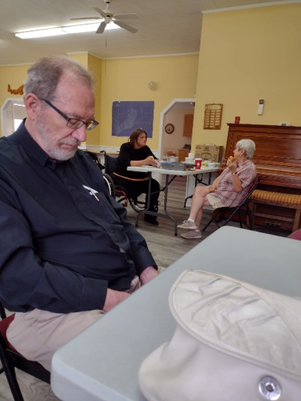On Boxing Day, we got together with family in London (Ontario) and had dinner in the hotel restaurant. The music playing in the background was some of my favourite songs from the and 70’s and 80’s such as the Walk of Life by Dire Straits. As enjoyable the music and the company were, it was a sad reminder that for the secular world Christmas ends on December 25th. Of course, for Christians, Christmas only begins on the 25th – or rather, Christmas Eve – and goes until Epiphany on January 6th or this year on the 5th if it is celebrated on Sunday – sorry to get into the weeds of the liturgical year.
Yesterday at my parish church of St. John the Evangelist,
Strathroy, we had a wonderful service of Christmas Lessons and Carols. Such services are often before Christmas Day,
but it is quite appropriate on the Fifth Day of Christmas (which was
yesterday). For the liturgical purists (which
I am not) Christmas Carols should not be sung until the Christmas Eve midnight
service and then sung throughout the Christmas season i.e. until Epiphany. Of course, the hotel restaurant was only being
a good secular organization and moving on from Christmas carols on the 26th. Like the observation of Advent, I know I am whistling
down the wind and fighting a losing battle in the non-church world, but I do
wish that people wouldn’t move on from Christmas after Christmas Day.
Here are some suggestions I found online for keeping the season
of Christmas throughout the 12 days:
Take time to enjoy the delights of the season.
- You
may have to clock back into work on the 27th. However, you can leave
the Christmas decorations up for the season at home (or on your
desk).
- Before
you start planning to cut calories (or carbs or fat) for the New
Year, enjoy the Christmas cookies your aunt made for you!
- Many
cultures have treats unique to Christmastide, and this is a perfect time
to explore those traditions.
- Continue
giving gifts or doing acts of kindness and
service for others; generosity doesn’t have to end at 11:59 pm
December 25th.
- Additionally,
many churches will include special services
during Christmastide. This is a great opportunity to participate in
the “story services” of the liturgical calendar. Personally, I’m looking
forward to attending our first Epiphany service this year!
In short, take time to savor the season after all of the
holiday-related busyness. Throw open the doors of hospitality to welcome in Our
Savior and the stranger.
To this I say Amen and would add, keep wishing others a Merry
Christmas throughout the 12 days.
So, a Merry Christmas to all and to all a good night on this
6th day of Christmas.

